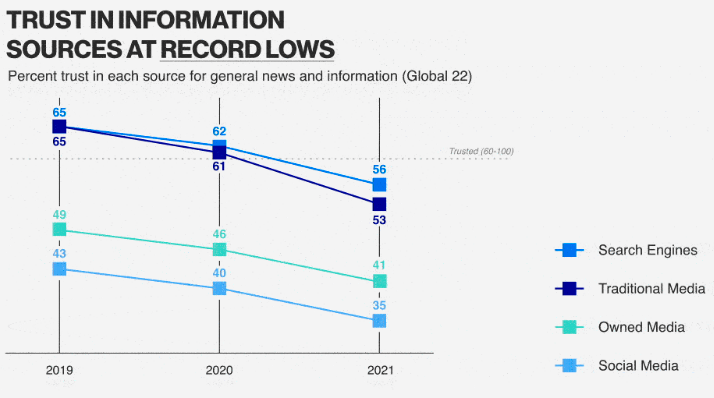Your website is ready for the next level, and it’s time to hire an SEO writer to give your content a major boost and start ranking higher with search engines.
But should you hire a content writer or a copywriter?
Is there even a difference? They’re both writing for SEO purposes, so does it really matter?
Yes, it does.
Both SEO content writing and copywriting have to do with the words on the page, but they each serve their own distinct purpose.
And this distinction helps you determine which method you need to employ in order to achieve the desired results.
Confusing the two – or ineffectively combining the two – will likely lead to subpar results. It’s worth considering the difference in order to choose the right method (and writer) for your project.
What is SEO Content?
Let’s start by breaking this down even further – what is SEO?
Search engine optimization (SEO) is the practice of enhancing a website in order to improve its visibility when people search for topics, services, and products on search engines such as Google or Bing.
The primary goal for SEO is to improve a user’s overall experience, as this is predominantly what search engine bots are looking for when they scan and rank the most relevant web pages.
This is where SEO content plays a key role. Search engines are looking for useful information that informs, entertains, educates, and/or solves a problem for users.
The primary goal of SEO content writing is to create high-quality, keyword-focused content that ranks well in search engines to generate organic traffic to a website.
What is SEO Copywriting?
In contrast, the primary goal of SEO copywriting is to convert traffic into leads and sales.
Are both content writing and copywriting capable of doing both?
Absolutely.
But the difference really comes down to what you are trying to do and which method does it better.
“SEO copywriting” is a bit of a misnomer. My belief is that the term is a result of many SEO experts confusing the two types of writing.
This is supported by the variety of answers I received when I casually surveyed a Facebook group of SEO experts on what SEO copywriting is:




Some SEO pros said the two types of writing are one and the same.
Others said they were different.
Others said there was an overlap.
Overall, there was no consensus on what “SEO copywriting” is or whether it even exists.
However, there’s no doubt that the term does exist and that users are actively searching for it online.
Part of the confusion is a result of the search intent being a bit muddled. Most people who are searching this keyword are actually looking for:
- Website content services.
- Blog posts.
- Ad copy.
- A sales page copywriter.
It can be difficult to tell when someone is actually searching for SEO copywriting.
For instance, as an SEO content writer myself, I often get SEO agencies inquiring about copywriting, Facebook ad copy, social media copy, sales pages, etc.
While these projects do involve content, they don’t necessarily involve SEO. Rather, they require sales copy – something that may or may not be part of an SEO content writer’s wheelhouse.
Even though “SEO copywriting” is a recognized term, it’s still important to make a distinction between SEO content writing and copywriting.
This is because the method you choose should be the best fit for what you are trying to accomplish with your content.
And once you know that, you can hire the right type of writer to get the job done.
Choosing the Right Writer for SEO Content
Depending on the needs of your project, you’ll want to hire an SEO content writer when your goal is to attract more organic traffic to your website through high-quality, keyword-optimized content.
An SEO content writer understands search engine optimization and knows how to write content that’s informative, compelling, and relevant.
However, they aren’t always effective when it comes to writing content intended to drive conversions.
SEO content serves a variety of purposes, including:
- Increasing keyword rankings.
- Driving clicks from search engine results pages (SERPs).
- Attracting high-authority backlinks.
- Directing users to other internal webpages.
- Converting website visitors into buyers, subscribers, and/or leads.
Therefore, you should hire an SEO content writer to write your website content – mainly, webpages and blog posts – if you want to increase organic traffic.
Great content can drive social shares, keep users on your website for longer, and improve conversions. It can also help you establish authority in your niche and drive awareness of your brand.
SEO content writers typically handle content such as:
- SEO-friendly blog posts.
- SEO-friendly service pages.
- Local SEO business content.
- PPC landing pages.
- Whitepapers.
- Link-building content.
- Guest posts for SEO.
- Ebooks.
If your main concern isn’t attracting more traffic but rather converting your paid and existing traffic into sales and leads, then you’ll want to hire a sales copywriter.
When To Hire an SEO Copywriter
There are many different types of copywriters, just as there are many different types of projects within a variety of copywriting niches.
Consider all the different platforms out there that require copy; Google ads, website landing pages, social media posts, print ads, brochures, product descriptions, Facebook ads, billboard ads, sales pages, product collection pages – the list goes on and on.
When your primary goal is to convert traffic into sales or leads, you need to hire an experienced copywriter. This traffic may be organic, but it may also be social media traffic, paid ad traffic, direct traffic, and so on.
Therefore, you’ll want to hire a copywriter who specializes in the exact type of copy you need and knows how to convert that specific type of traffic.
For example, a Facebook ad copywriter may not be a pro in writing print ad copy.
The research, targeting, writing, formatting, and final execution process can be completely different for each type of copy project.
Types of projects that copywriters often handle include:
- Facebook & Instagram ads.
- Social media posts.
- Email campaigns.
- Print marketing materials.
- Video scripts.
- Sales pages.
- Newspaper ads.
- Product descriptions.
- Non-SEO landing pages.
- Business names & taglines.
- Website copy (brand messaging).
- Product demos.
- Call-to-action buttons.
- On-site navigation copy.
Typically, you’ll be able to find a skilled copywriter by doing a Google search of the specific type of copy you are looking for.
However, some projects can be so niche that it might be a challenge to find a copywriter who fits the bill. In that case, you can search for a general copywriter and ask if they are experienced in that type of project.
Even if they aren’t, they may know someone in the agency or industry and help you get connected with the right person.
Remember, the success of any marketing campaign depends on a copywriter’s ability to write converting sales copy.
Their process should involve conducting market research, writing copy that resonates with that audience, and including calls-to-action that entice users to buy.
The Right Skills to Look for When Hiring an SEO Writer
Once you’ve determined your SEO writing needs and decided to move forward with either an SEO content writer or SEO copywriter, you’ll want to make sure you choose the right partner with the right skillset.
In addition to selecting a writer who fits your brand, you should be looking for these important skills:
1. Up-to-Date SEO Writing Practices
SEO best practices are constantly evolving with search engine algorithms.
When you invest in a writer to help your content become SEO-friendly, it’s crucial that your writer is familiar with the latest updates and knows what search engines are looking for.
2. Understand Conversion Copywriting
If improving your conversion rate is your top goal, you need to partner with a writer who knows how to write great copy that can achieve that objective.
Don’t be afraid to ask a writer about their average conversion rates and past experience to make sure they have a proven track record.
3. Understand Search Intent
Search intent, also known as user intent, is the primary objective for a user when seeking information via a search engine.
For example, let’s look at [birthday cakes] as a keyword.
Someone who wants to learn how to bake a birthday cake has a much different search intent than someone who is looking for a local cake-decorating service or someone else who wants to know when and how the birthday cake tradition began.
A strong SEO writer should understand the search intent and write high-quality content for a keyword-specific topic, not just the keyword.
4. Be a Thorough Researcher
The 2021 Edelman Trust Barometer shows a concerning trend – consumer trust in media and institutions is at a record-breaking low.

Brands can’t afford to publish less-than-trustworthy content and risk losing the trust of their audience. Copywriters and content writers alike need to be thorough researchers in addition to being competent writers.
5. Understand the Target Audience Demographics
A strong writer is able to adapt to different audiences.
Content for consumers 65+ has a very different tone and style than content intended for Gen Z and millennials.
It’s important to make sure the writer you choose can handle diverse assignments and knows how to reach your audience.
How to Measure Copywriting SEO Performance
The success of your content marketing or copywriting campaign will depend on the specific goals and key performance indicators (KPIs) you set.
Some of the most common KPIs used to measure campaign success include:
- Brand awareness.
- Lead generation.
- Email subscribers.
- Ranking keywords.
- On-site conversions.
- Click-through rates (CTR).
- Web traffic through organic search.
- Social media likes, comments, and shares.
Good content is judged by its performance and those consuming it. The exact same campaign executed by two different brands can be a success or failure depending on the brand’s goals.
If the content is earning triple the social media shares, it would be considered a success for a brand whose primary KPI was improving its presence on Facebook.
But if the target KPI was lead generation, that same campaign could be considered a failure.
Choosing the correct writer based on your SEO content writing or copywriting needs is crucial to executing a successful campaign.
More Resources:
- 10 Elements of Good SEO Copy
- SEO Writing: Top 47 Tips to Master a Combined Art
- Content Marketing: The Ultimate Beginner’s Guide
Image Credits
All screenshots taken by author, August 2021





